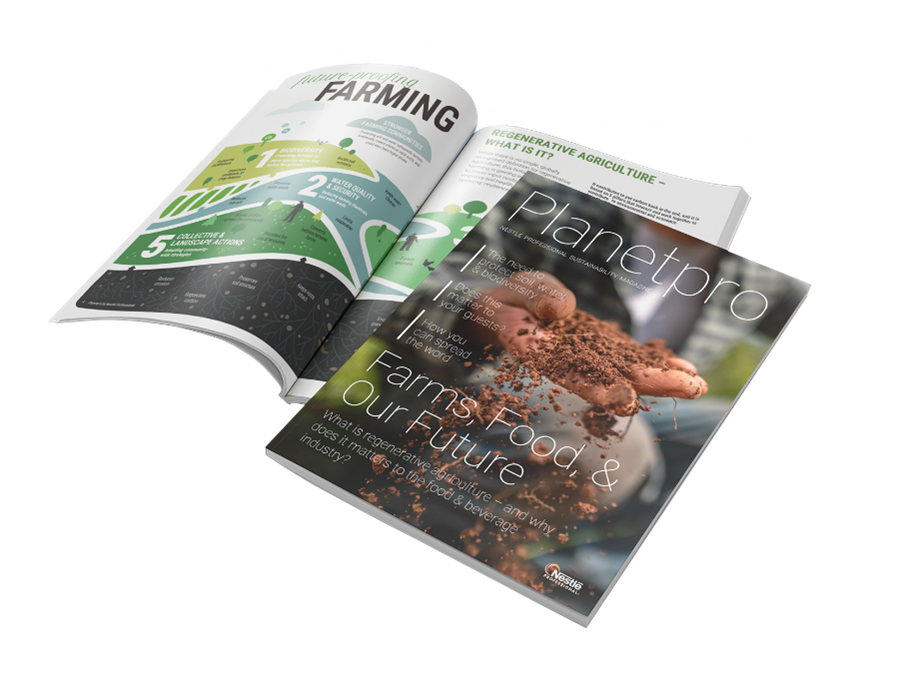
Regenerative Agriculture: What is it, and Why it Matters to your Business.
Farms have helped feed the world for centuries, but some farming practices deplete soil and water quality, with resources like land and water becoming more and more limited over time. To continue growing enough food to feed the world in the face of increasing climate change, agriculture may need some different solutions.
While there is no single, globally recognised definition for regenerative agriculture, this approach to farming involves holistic farming practices that aim to lower input costs, capture carbon, improve soil health, and boost farming systems’ resilience1. This involves consideration to the 5 pillars of Biodiversity, Water, Soil, Livestock and Land.
There is value in discovering innovative ways to cultivate our land, but you may wonder: why does this matter to you? How will it resonate with your guests? In this article we will outline three reasons why regenerative agriculture matters to you, and how it resonates with your guests.
Consumers Care
Recent data suggests that these practices could be a plus with your guests; after the concept of Regenerative Agriculture was introduced to consumers, 73% agreed they would be more likely to trust retailers and brands that implement those practices. 72% agreed that they would be more likely to purchase from them.2
Connect with your Consumers
Regenerative agriculture could boost perceptions among consumers, as they intuitively link it to nutrition, health and quality.3 Consumers are won over by products that can claim sustainable manufacturing processes, carbon neutrality, organic and regenerative credentials, including regenerative agriculture. Consumers lean into products like these, not only because they promote soil health and traditional farming practices – but also because they align with other concerns like health and nutrition, budget-friendliness and social fairness. 4
DID YOU KNOW? 70% of consumers say that sustainability is more important when choosing a product than two years ago. This trend underlines the increasing significance of regenerative agriculture in consumer decision-making. 5
Supporting our Ecosystems & Community
Over 50% of Australian consumers prefer to shop local across several market categories 6 – showing the community’s deep care about our local people, biological diversity and ecosystems. Regenerative agriculture supports soil health, improves biodiversity, and protects watersheds, contributing significantly to ecological and economic resilience 7. Resonate with customers and differentiate by showing customers you play a part in protecting our land.
In conclusion, regenerative agriculture represents a pivotal shift towards sustainable farming practices that not only enhance soil health and biodiversity but also resonate deeply with consumers' growing demand for sustainability. By adopting these practices, businesses can foster stronger connections with their customers, who increasingly prioritise eco-friendly and socially responsible products.
As we face the challenges of climate change and resource depletion, understanding regenerative agriculture is not just beneficial for the environment but also an advantage for businesses seeking to foster stronger connections with their customers.
For more information on regenerative agriculture, click on the link below to download our sustainability magazine, Planetpro.
Sources:
- Alexanderson M.; Luke H.; Lloyd D.; Regener-ative Farming as Climate Action. Journal of Environmental Management. 2023.
- ADM. Farming for the Future: The State of Regenerative Agriculture Program Adoption. 2023.
- Nestlé, Ipsos Study. Regenerative Farming. 2023.
- thefoodpeople; Pasta, Rice, Noodles & Pulses 2024 (categorywatching report)
- Gelski, J. (2025). The future of menus includes upcycled ingredients. Food Business News. https://www.foodbusinessnews.net/articles/24985-the-future-of-menus-inc…
- Commonwealth Bank of Australia. (2025). Consumer Insights Report. Retrieved from https://www.commbank.com.au/articles/newsroom/2021/05/consumer-insights…
- White, C. (2020). Why regenerative agriculture? The American Journal of Economics and Sociology, 79(3), 799–812. https://doi.org/10.1111/ajes.12334
Ready to learn more about sustainable practices in your business?
Get valuable information on how to reduce your environmental footprint with our magazine Planetpro. Download here.



